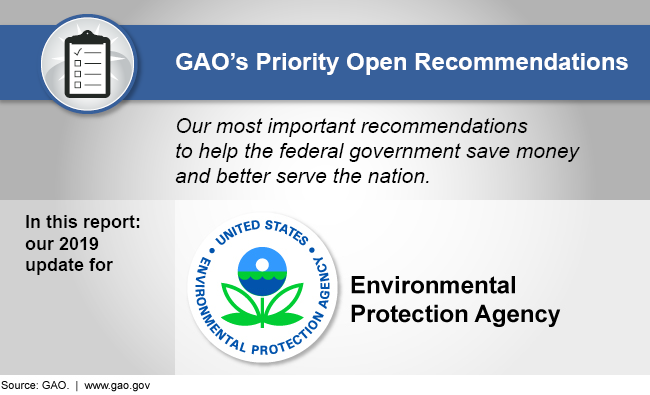Priority Open Recommendations: Environmental Protection Agency
Fast Facts
Each year, we make more than 1,000 recommendations to help improve the federal government. We alert department heads to the recommendations where they can save the most money, address issues on our High Risk List, or significantly improve government operations.
This report outlines our 17 priority open recommendations for EPA as of April 2019.
For example, in July 2018, we recommended that EPA provide information to states and school districts on schedules for lead testing, what to do if lead is found in school drinking water, and the related costs.
Since our previous letter in March 2018, EPA implemented 5 of our priority recommendations.

Graphic showing that this report discusses GAO's 2019 priority recommendations for the Environmental Protection Agency
Highlights
What GAO Found
In March 2018, GAO identified 19 priority recommendations for the Environmental Protection Agency (EPA). Since then, EPA has implemented five of those recommendations by, among other things, taking actions to improve the risk evaluation of chemicals under the Toxic Substances Control Act and help oversee State Revolving Fund programs for drinking water and wastewater infrastructure.
In April 2019, GAO identified three additional priority recommendations for EPA, bringing the total number to 17. These 17 recommendations involve the following areas:
- assessing and controlling toxic chemicals,
- addressing data, funding, and cybersecurity issues for drinking water and wastewater infrastructure, and
- reducing pollution in the nation's waters.
EPA's continued attention to these issues could lead to significant improvements in government operations.
Why GAO Did This Study
Priority open recommendations are the GAO recommendations that warrant priority attention from heads of key departments or agencies because their implementation could save large amounts of money; improve congressional and/or executive branch decision making on major issues; eliminate mismanagement, fraud, and abuse; or ensure that programs comply with laws and funds are legally spent, among other benefits. Since 2015 GAO has sent letters to selected agencies to highlight the importance of implementing such recommendations.
For more information, contact Mark Gaffigan at (202) 512-3841 or gaffiganm@gao.gov.
